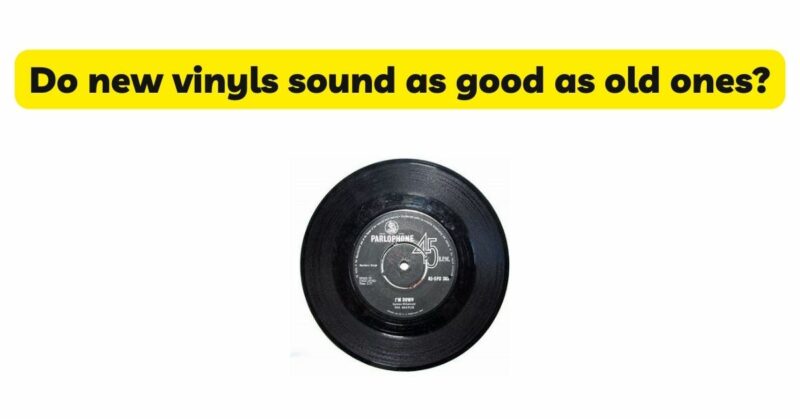Vinyl records have experienced a remarkable resurgence in recent years, captivating music enthusiasts with their unique sound and tactile appeal. One question that often arises in discussions about vinyl is whether new vinyl records can match the sound quality of their older counterparts. In this article, we will delve into the topic and explore the factors that influence the sound quality of both new and old vinyl records. By examining manufacturing techniques, vinyl quality, mastering processes, and individual preferences, we aim to shed light on the eternal debate of whether new vinyls sound as good as old ones.
Manufacturing Techniques: The manufacturing techniques employed for vinyl records have evolved over time. Older records were often pressed using heavy machinery and analog processes, which some argue contribute to their unique sound quality. However, modern pressing plants have embraced advanced technologies and precise manufacturing processes, resulting in new vinyl records that can rival the sound quality of their older counterparts.
Vinyl Quality: The quality of vinyl used in record production has improved over the years. Older vinyl records may have been pressed with formulations that were susceptible to wear and surface noise. In contrast, modern vinyl formulations are designed to provide better durability, reduced noise, and improved playback characteristics. Consequently, new vinyl records can deliver a cleaner sound with fewer surface imperfections.
Mastering Techniques: Mastering plays a crucial role in the sound quality of vinyl records. Older vinyl records often benefited from analog mastering techniques, which some argue added warmth and character to the sound. However, modern mastering techniques have advanced significantly, allowing for precise control over the audio and the ability to enhance details and dynamics. Skilled mastering engineers can bring out the best in both new and old recordings, resulting in exceptional sound quality.
Original Recordings: The source material of vinyl records plays a significant role in their sound quality. Both new and old records can feature original recordings captured using various techniques. While older recordings may have been captured using analog equipment, modern recordings are often done digitally. The choice of recording techniques, equipment, and mixing processes can affect the overall sound quality of the vinyl record, regardless of its age.
Remastering and Reissues: Many new vinyl records include remastered versions of classic albums or reissues of older recordings. Remastering involves revisiting the original tapes and applying modern techniques to enhance the sound quality. When done meticulously, remastered versions can offer improved clarity, dynamics, and overall fidelity. Thus, new vinyl releases can provide a fresh listening experience while maintaining the essence of the original recordings.
Individual Pressings and Variability: It’s essential to consider that sound quality can vary among different pressings of both new and old vinyl records. Factors such as the pressing plant, vinyl weight, quality control, and mastering choices can influence the final sound reproduction. Consequently, the sound quality of a specific vinyl record may depend on the particular pressing and manufacturing quality, rather than solely on whether it is new or old.
Subjective Listening Experience: Sound perception is highly subjective, and individual preferences play a significant role in determining what sounds “good.” Some listeners appreciate the warmth and nostalgia associated with the sound of old vinyl records, while others enjoy the clarity and fidelity offered by new vinyl releases. Personal preferences, listening equipment, and the listening environment can greatly influence one’s perception of sound quality.
Conclusion: The debate surrounding whether new vinyls sound as good as old ones is multifaceted. While older records possess a distinct vintage charm, modern manufacturing techniques, improved vinyl formulations, advanced mastering processes, and meticulous remastering have allowed new vinyl records to achieve exceptional sound quality. Ultimately, the perception of sound quality is subjective and can vary among listeners based on personal preferences and factors such as equipment and environment. Regardless of their age, vinyl records continue to captivate and engage music lovers, offering a unique and immersive listening experience that transcends the bounds of time.


